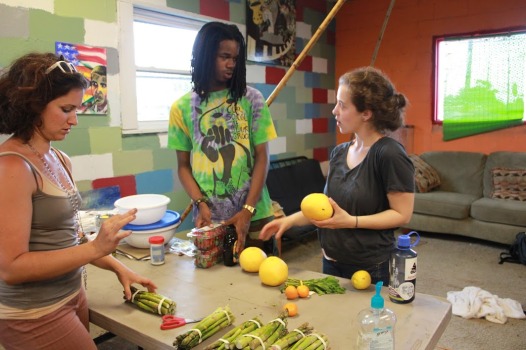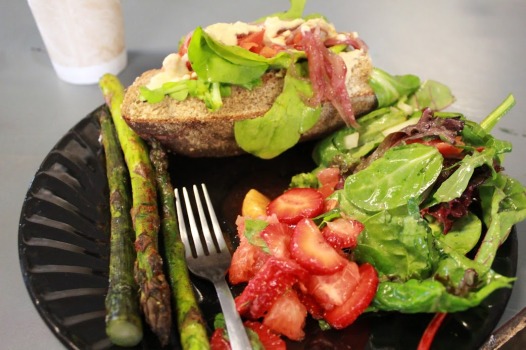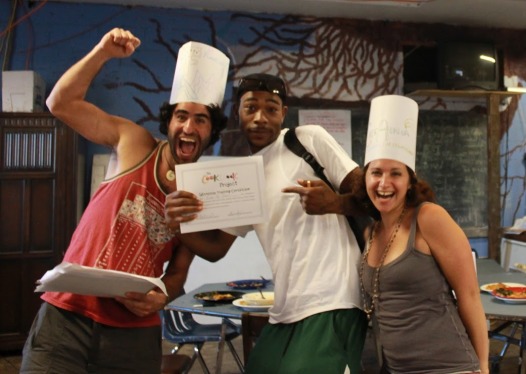
The Cookbook Project uses cooking to address global health issues.
While teaching English in Hanoi, Vietnam, Adam Aronovitz noticed a disturbing trend in local eating habits.
As part of an English lesson, Aronovitz had asked his students to name their favorite foods. He found the answers shocking.
Pizza, fried chicken and American fast food accounted for nearly all the responses. For a population with such a rich and healthy food culture, Aronovitz says, his students’ food choices were cause for alarm.
Aronovitz and his wife, Alissa Bilfield, are co-founders of The Cookbook Project, a New Orleans-based non-profit whose mission is to “empower youth to be catalysts for healthier communities through food literacy and cooking education.”
In Vietnam, and in many other developing countries around the world, not only have youth begun craving these American-exported, processed foods, Aronovitz says, but they have developed an inferiority complex about their own traditional cuisine.

A Cookbook Project offering
Aronovitz and his wife decided to create a program around food and cooking to try to change that trend. Combining his experience as a classroom teacher with Bilfield’s knowledge of environmental and agricultural issues, the couple developed a hands-on curriculum centered around youth. They based it on experiential education, culturally relevant eating and cooking, discovering recipes, learning more about food, and “empowering people to be change makers in all the decisions that they make.”
“We never really set out to start an organization,” Bilfield says of The Cookbook Project. “It kind of happened by sort of a domino effect.”
At first, the couple reached out to organizations in whatever country they found themselves in during a year of international travel following Aronovitz’s teaching stint. Quickly, however, the couple realized that the most effective way to bring change to communities was to train community leaders in their newly developed food curriculum. Instead of bringing in outsiders to teach these concepts to youth, Aronovitz and Bilfield found that integrating trusted and respected individuals from the community into the teaching process was crucial to making a lasting impact.
“It evolved from Adam and I backpacking around the world to building this grassroots system of local educators,” Bilfield says. “While it was really fun to travel and do projects, building local capacity and local knowledge is really important.”
The couple brought The Cookbook Project to New Orleans a year ago.

Adam Aronovitz, left, and Alissa Bilfield, right, celebrate with a happy workshop graduate.
At the onset of a typical workshop, each participant creates a food culture recipe. These recipes then become the catalyst for exploring nutrition, community health, cooking and sustainability. The youth explore these concepts through experiential and active exercises. The workshop culminates in a Food Culture Celebration at which youth work in groups to prepare a healthy celebratory meal to share with their community.
One of the keys to their curriculum, the couple says, is staying away from authoritative, commanding language.
“It’s less about telling people what they should and shouldn’t be doing,” Bilfield says. “Nobody likes to hear that. It’s more about empowering people with information and showing them alternatives.”
Rather than preaching entirely new diets and recipes, The Cookbook Project curriculum suggests simple replacements such as substituting brown rice for white rice in a classic red beans and rice dish.
If a typical meal consists of fried chicken and French fries, adding a side of collard greens would be a great way to add color and fiber to the plate.
The simple act of cooking at home, Aronovitz says, is significantly healthier and drastically cheaper than eating out—even at a fast food joint.
So why NOLA?
Aronovitz graduated from Tulane University and taught in New Orleans schools before Hurricane Katrina.
The couple decided to move The Cookbook Project down to New Orleans because of the major health concerns that this city faces, combined — and potentially at odds with — its unique and lively food culture.
“New Orleans, more than any other urban area in the United States, is suffering from obesity, Type 2 diabetes and chronic disease in general,” Aronovitz says. “Much of the city is a food desert, so people not only lack the resources to be able to start to cook at home, but they are not sure how to take steps to do it.”
What makes New Orleans an ideal home for the organization, Bilfield says, is the city and its residents’ infatuation with all things food.
“Something New Orleans really has going for it is this rich food culture that gets people excited,” Bilfield says. “Talking to the average person about New Orleans food, you’re going to be there for a long time. It’s a really big part of life here and I think that in itself is a really powerful tool to get people back in the kitchen.”
“There is not a place in the United States,” Aronovitz adds, “where food culture is such an important aspect of the tradition.”
In the post-Katrina landscape of the city, change-makers like The Cookbook Project have the opportunity and the leeway to try new things and develop lasting change.
“It’s clear that people in New Orleans want to see increased social innovation,” Aronovitz says. “It’s a wonderful place to be an innovator.”
______________
The New Orleans Food Literacy Initiative (NOFLI) is officially underway! This Nola-focused Food Literacy Educator Training Program is designed for educators, community leaders, volunteers and health professionals working in New Orleans.
Application Deadline: October 28, 2014 11:59pm CST.
To register, visit www.thecookbookproject.org.
 NOLAbeings Multimedia artist Claire Bangser created NOLAbeings as a portrait-based story project that marries...
NOLAbeings Multimedia artist Claire Bangser created NOLAbeings as a portrait-based story project that marries...  Voodoo in New Orleans: Reviving history: New Orleans fortune telling This article takes a deep dive into the history of Voodoo in New Orleans, its hybridization with Catholicism, and its present-day place in the city's culture. The author visits fortune-tellers in the French Quarter, using their guidance as a tool for introspection rather than a deterministic predictor of the future. Through her experiences in New Orleans, the author feels a mystical connection to both the past and the future.
Voodoo in New Orleans: Reviving history: New Orleans fortune telling This article takes a deep dive into the history of Voodoo in New Orleans, its hybridization with Catholicism, and its present-day place in the city's culture. The author visits fortune-tellers in the French Quarter, using their guidance as a tool for introspection rather than a deterministic predictor of the future. Through her experiences in New Orleans, the author feels a mystical connection to both the past and the future. 